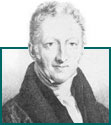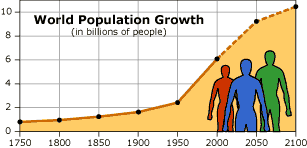Which Scientist Showed That Populations Increase Faster Than Food Supplies Can?

Thomas Malthus (1766-1834) has a hallowed place in the history of biology, despite the fact that he and his contemporaries thought of him not as a biologist only as a political economist. Malthus grew upward during a time of revolutions and new philosophies about human nature. He chose a conservative path, taking holy orders in 1797, and began to write essays attacking the notion that humans and society could exist improved without limits.
Population growth vs. the food supply
Malthus' most famous work, which he published in 1798, wasAn Essay on the Principle of Population as information technology affects the Future Improvement of Gild. In it, Malthus raised doubts near whether a nation could always reach a bespeak where laws would no longer be required, and in which anybody lived prosperously and harmoniously. There was, he argued, a built-in agony to human existence, in that the growth of a population volition always outrun its power to feed itself. If every couple raised four children, the population could easily double in twenty-5 years, and from so on, it would keep doubling. It would rise not arithmetically—by factors of three, four, 5, and then on—simply geometrically—past factors of iv, 8, and sixteen.

If a country'south population did explode this way, Malthus warned that at that place was no hope that the world's food supply could continue upward. Clearing new land for farming or improving the yields of crops might produce a bigger harvest, but it could only increase arithmetically, not geometrically. Unchecked population growth inevitably brought famine and misery. The only reason that humanity wasn't already in perpetual famine was considering its growth was continually checked past forces such as plagues, infanticide, and merely putting off marriage until heart historic period. Malthus argued that population growth doomed any efforts to amend the lot of the poor. Extra money would allow the poor to have more children, only hastening the nation's appointment with famine.
A new view of humans
Malthus made his groundbreaking economic arguments by treating homo beings in a groundbreaking fashion. Rather than focusing on the private, he looked at humans equally groups of individuals, all of whom were subject area to the same basic laws of behavior. He used the same principles that an ecologist would use studying a population of animals or plants. And indeed, Malthus pointed out that the same forces of fertility and starvation that shaped the human race were also at work on animals and plants. If flies went unchecked in their maggot-making, the earth would soon be human knee-deep in them. Near flies (and most members of whatever species you lot choose) must die without having any offspring. And thus when Darwin adapted Malthus' ideas to his theory of evolution, it was clear to him that humans must evolve like whatever other animal.
Which Scientist Showed That Populations Increase Faster Than Food Supplies Can?,
Source: https://evolution.berkeley.edu/the-history-of-evolutionary-thought/pre-1800/the-ecology-of-human-populations-thomas-malthus/
Posted by: dossearclonime.blogspot.com


0 Response to "Which Scientist Showed That Populations Increase Faster Than Food Supplies Can?"
Post a Comment